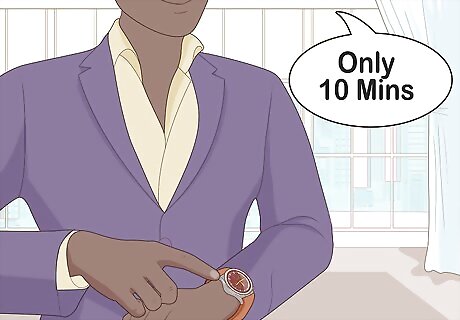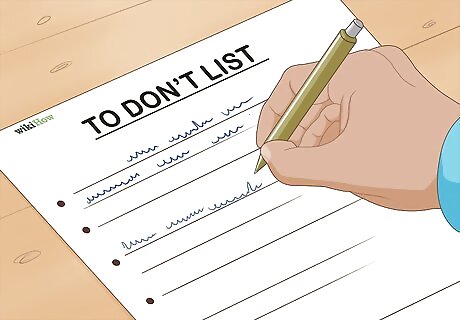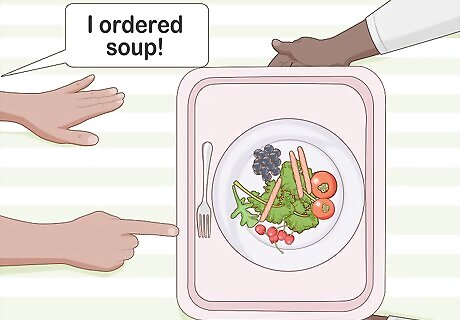
views
Starting with Self-Promotion

Treat yourself better. If someone is undervaluing you, it's very likely you are doing the same. Respect yourself and know what you deserve. Give yourself credit for your achievements and think about those who love and trust you. This will help dial up your confidence. Physically care for yourself because a healthy body makes a healthy mind. Eating clean and getting some exercise generates positivity.

Fake it 'til you make it, and you will become it. If you find yourself insecure in a high-pressure situation, rise up and act confident anyway. Keep faking your confidence and eventually you'll realize you are actually achieving what you've set out to do. Try using more confident body language by opening up. Pull your shoulders back and relax your arms. Your physical biology and psychology alters when holding a power pose. Testosterone levels rise, and cortisol levels (a stress hormone) lower. If you know you are walking into a high-pressure situation, take two minutes to strike a power pose. Do the superman/woman stance, or lift your chin and raise your arms like you would after winning a race. If you are already in the situation, stand strong and avoid folding your arms and touching your neck. These gestures make you look smaller and are signs of passive defense.

Embrace your stress. If your bully or manipulator is coming toward you and your heart begins to pound, make this stress your friend. Your body is rising to the challenge, and preparing you for the high-pressure situation. Don’t fear your manipulator, your body is strong! Studies show if you view stress as a positive reaction, your blood vessels will relax in the same way it does when you are happy or confident. Choose to see stress as helpful and you will find courage.

Seek support. Trust yourself to handle life's challenges, but you don't have to face them alone. If you are feeling used, reach out to someone. This person can objectively look at the situation and give you the support you need. Human connection releases oxytocin a neurochemical known as the “cuddle hormone”. It releases feelings of trust, relaxation and psychological stability, allowing the body to adapt to highly emotive situations. So it you are in a stressful spot, finding someone to support you is a wise choice. This could be a coworker, teacher, parent or friend.
Changing Your Response

Teach others how to treat you. If you consistently respond with your true feelings, you will teach others how to treat you correctly. Over time people will learn and adapt to your behavior and will put you in less high-pressure situations. Others may not even realize they are walking all over you if you don’t express yourself. Manipulative people will seek you out if they need something because they know you will not confront them. Once they learn you will not be used, they will stop. Your responses do not have to be dramatic. Simply respond in the same way you would like someone to respond to you if they deny helping you.

Set a limit. If you agree to do what your user asks of you, lay out your limitations right away. This way you will not be burdened and your user will be satisfied. Both parties win. This could be something like, if your peer needs help with their homework, give a time limit. If your co-worker asks you for help on a project, take the smallest task because you have your own work you need to do.

Stall. Whenever someone asks you for something you are uncomfortable with, it’s totally acceptable to say that you'll need to think about it. This gives you time to consider if you actually want to help. If the person needs an immediate answer, say "No". You can always go back and say "Yes" if you realized you're okay with helping out. But if you immediately say "Yes" you are automatically committing to the situation.

Learn to say "No". "No" can be a scary word because it is confrontational, but "No" can make you feel powerful. It shows others that you and your time is valuable. Using "No" doesn’t have to be aggressive, because it’s just honesty. You’re not being offensive, you’re just articulating that you have other things you need to take care of.
Realizing You Have A Choice

Create a “to don’t” list. Knowing what you do and do not want to do is essential to developing confidence and assertiveness. Think about the things you do for others that make you feel used, and write them down. You may be taken advantage of more than you think. For example, if you always pick up the check, put it in the "to don't" list. Ask your friend to pick it up next time. Organizing information in list form and checking it off hits our information processing sweet spot. This list will be easy to follow and satisfying to fulfill.

Pick your battles. If the thought of confronting high-pressure situations makes you sick, start small. You may not be able to stand up to your bully right away, but you can make little changes to build your assertiveness. If you ordered a salad but received a soup, send it back. Once you start getting comfortable with asserting yourself in small situations like this, start building up to bigger ones.

Expect the best. If you expect you are going to fail, you have already accepted failure. Base your expectations on what you would love to see happen, not what bad thing you are expecting to happen.

Cut out the negativity. If you have done all you can to correct the situation, get out of it. Try to remove yourself as much as possible from the person who is trying to take advantage of you. Life is too short for you to put up with someone who disrespects you. Make the brave choice and remove this person from your life. Keeping them in your life will do nothing but maintain the negativity and you will find it harder to grow confident.




















Comments
0 comment